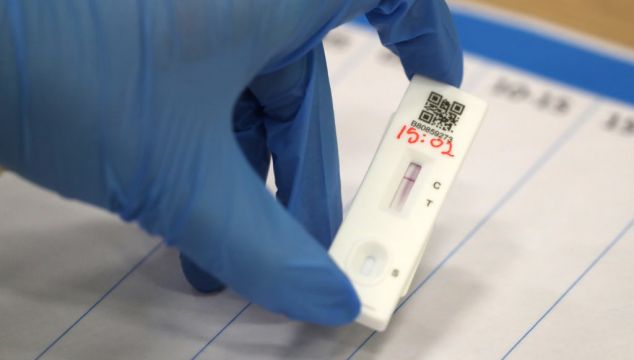The Covid adviser to the Irish College of General Practitioners (ICGP), Dr Mary Favier has warned that people can be “falsely reassured” by negative antigen test results.
That was a real concern, she told RTÉ radio’s Today with Claire Byrne show.
“If you have a negative antigen result it doesn’t mean you don’t have Covid,” she said.
However, if a person tested positive then it was very likely that they did have Covid, and they should get a PCR test, she urged.
Dr Favier expressed concern that parents were using tests for reassurance on children who had symptoms and then sending them to school. Any child with symptoms should stay at home, she said.
Dr Favier explained it was a very difficult and stressful situation for parents and for teachers, but schools were managing the situation very well.
'Big challenge'
It was a “big challenge” for parents and GPs to tell the difference between a severe respiratory infection and Covid because the symptoms were so similar, that’s why it was important to get a PCR test.
“We’re going to have a very busy winter.”
Dr Favier said she had never seen so many cases of respiratory infection so early and so many children getting very sick, some requiring hospitalisation.
The booster campaign for over 80s was now complete, she said with the over 70s due to be concluded this week (in her practice). It was great to see how effective the booster campaign was with Covid rates in those cohorts dropping, she added.
GPs are under pressure because there were not enough general practices in the country. The Covid adviser said that was why some GPs were referring over 70 and over 80s to vaccination centres.
Dr Favier said she was aware of some cases where individuals entitled to the booster had gone to vaccination centres without an appointment and had received the vaccine, but it was a subtle balance and people needed to stick to the HSE advice and await an appointment.
Anyone who was not yet vaccinated would be given priority if they registered and would receive their vaccine within two days, she said.
Meanwhile, the chief medical officer has warned people against using antigen tests if they have symptoms of Covid-19.
Dr Tony Holohan said there are many people who do not understand when antigen tests should be used.
He said that around one in five adults reported using a rapid test in recent weeks, with the majority of those adults having had symptoms.
Symptoms
The medical expert warned that is not the public health advice, and that people with symptoms need to take a PCR test.
Minister for Health Stephen Donnelly will bring a memo to Cabinet on Tuesday that could see the Government subsidise the tests.
Dr Holohan said it is not a mistake to subsidise the rapid tests, but said the public has to understand when they should be used.
“We’ve always said there’s a role for these tests. These tests have been used for quite a period of time, we’ve always recommended the use of high incidence situations to support the investigation of outbreaks,” Dr Holohan told RTÉ’s Morning Ireland.
“The issue is that, we have survey data that we generate through our weekly population survey. Our most recent data from Wednesday of last week shows that in the previous week, about one in five adults report that they used an antigen test in the previous week.
“The majority of those said that they use them when they have symptoms, that is not the public health advice. Then those who use them when they had symptoms, only about a third of them went on to take a PCR test and restrict their movements. Again, that’s not the public health advice.
“What we really need to do now is focus on trying to ensure that people understand when they should use them.
“So if you have symptoms, a PCR test is the right test. An antigen test is not the test for you.”
He said that people who are asymptomatic should take a rapid test before taking part in “some high-risk activity” or thinking of going to a wedding.
He said that a positive result is what the public should rely on.
“If the result comes back positive, you stay away. If the result is negative, it doesn’t mean that you don’t have the disease,” he added.
He also said that sending children to school with Covid-19 symptoms is a “no-no”.
“You shouldn’t be taking antigen tests in order to determine that your child doesn’t have the disease and then sending a symptomatic child into school,” he added.
Restrictions
The National Public Health Emergency Team (Nphet) is meeting on Thursday to discuss restrictions brought in last week.
He said it is unlikely they will see any significant changes to the incidence rate in the community.
Ireland is experiencing a fourth wave of the pandemic, prompting fears about the capacity of the health system to cope.
“We’ll keep monitoring the course of the disease as we go through this weekend into next week,” he added.
“When and if we think we see signs of improvement, which is what we’d hoped to see in the first instance, we’d expect to see those beginning to appear this week, if things are beginning to improve.
“We don’t know that that’ll be the case, but we’ll be looking out for them.
“If they do, we’ll call that and we’ll give government advice based on that.” - Additional reporting from Press Association







